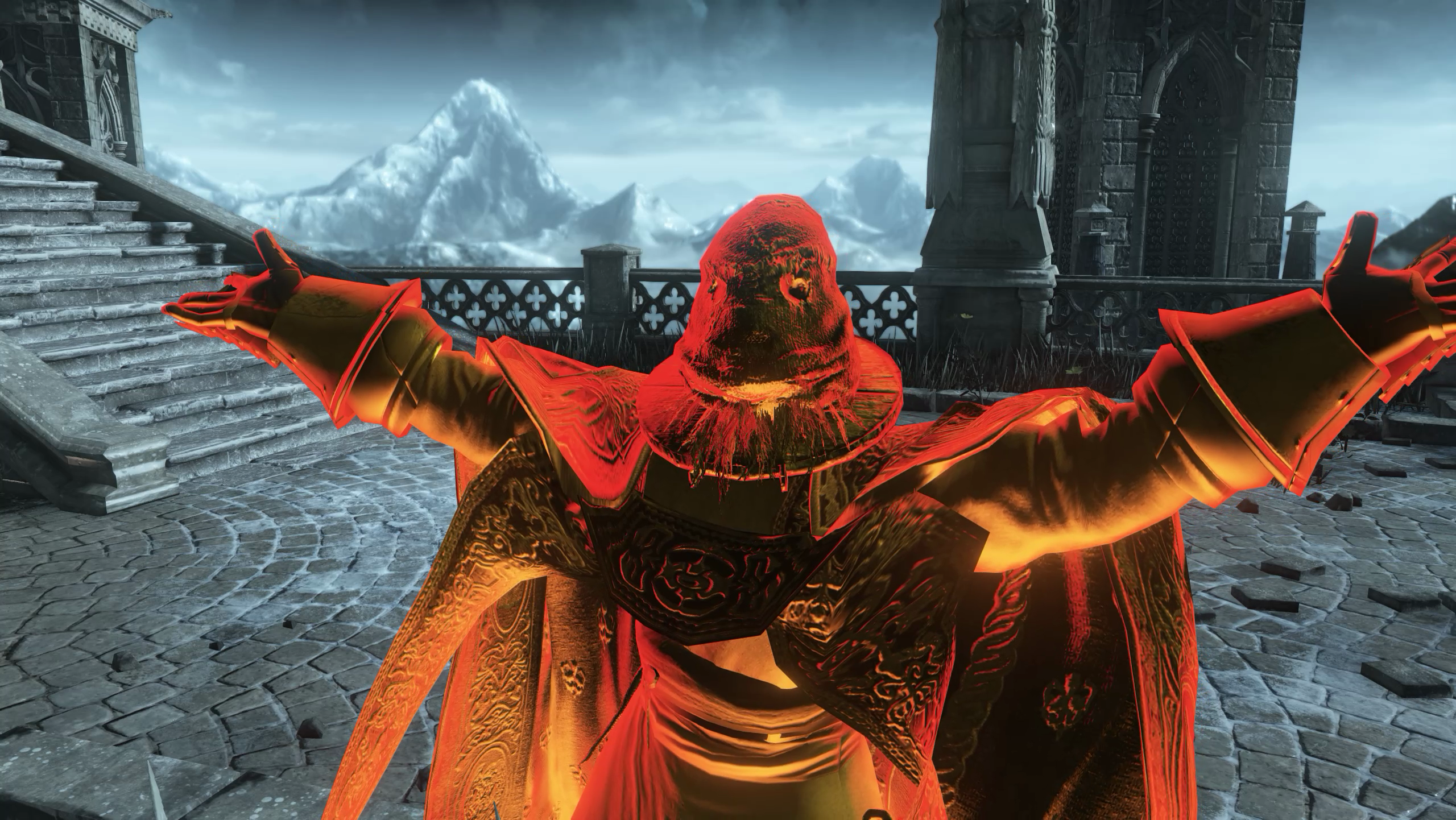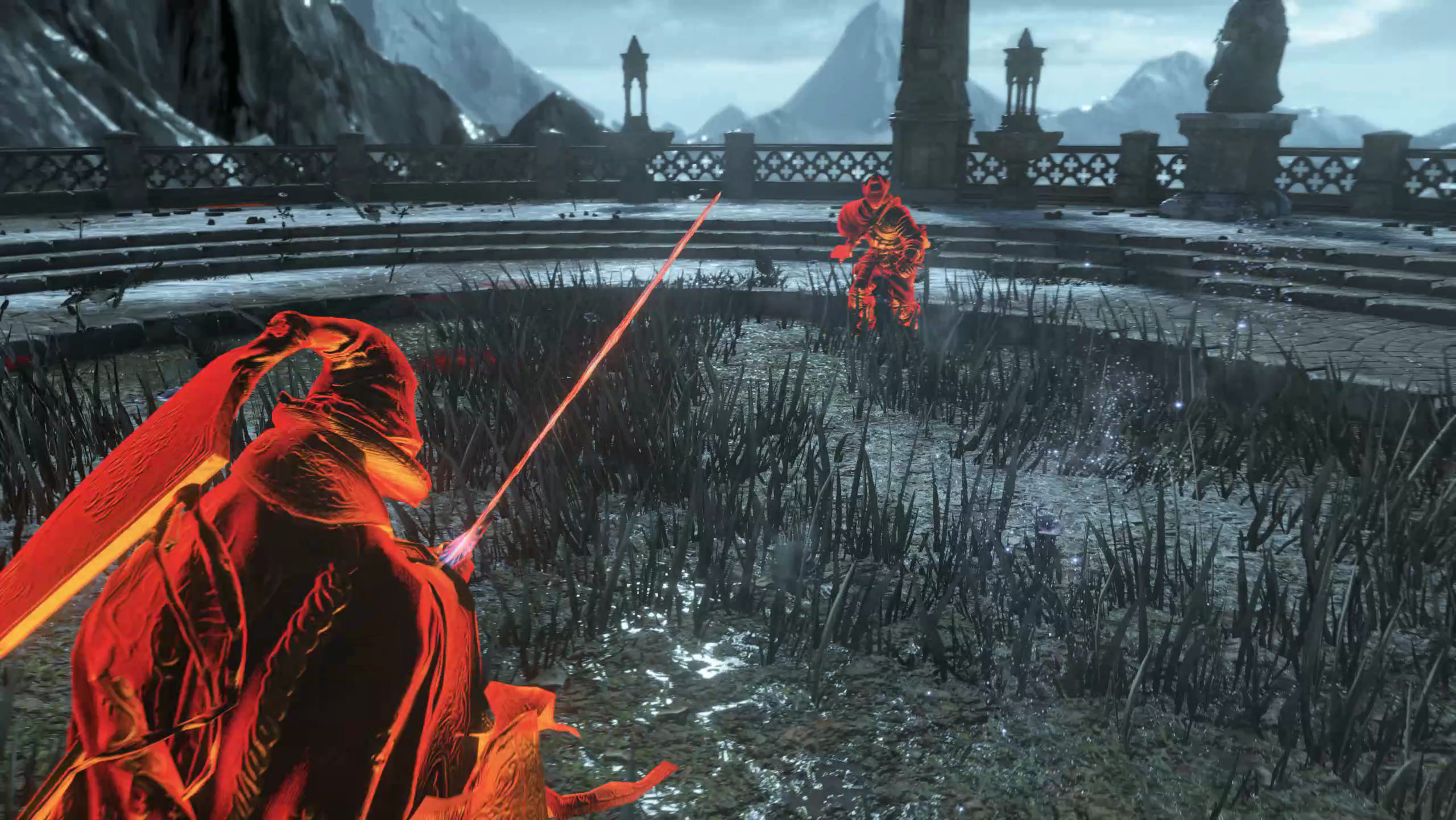Why everybody should embrace Dark Souls 3’s multiplayer

Our hidden weapon guide helps you find DS3's most powerful weapons.
Just getting started? Choose how to play with our class guide.
Our beginner's guide offers 10 tips for new players.
This lore guide will sweep you away to a world of gothic fantasy.
Jumping into multiplayer? Check out our multiplayer guide for a whole bunch of tips and tricks.
The most common observation about the Dark Souls games is also the most boring: that they’re difficult. I’ve grown so weary of this lazy characterisation of Dark Souls over the past five years that it’s started to provoke a reflexive eye-twitch whenever I see it. Dark Souls (and its sequels) are some of the most interesting games ever made. To me, they feel almost bottomless. Even writing a book about Dark Souls couldn’t get it out of my system. Is “it’s hard” really the most interesting thing you can say about them? Thematically, the Dark Souls series is all about contrasts and allusions: fire and dark, life and death, suffering and jubilation. Everything in these games has two sides to it—not least the thing that I personally find most rewarding and interesting about Dark Souls: the multiplayer.
Returning to human form (or, as is Dark Souls 3’s equivalent, restoring your ember) allows you to invite other people into your world to help you, but also opens you up to invasions from less well-wishing fellow players. This double-edged form of multiplayer was extraordinarily forward-thinking when it debuted in Demon’s Souls in 2009, and it remains the thing that makes Dark Souls worth playing for me. Over time the nuances of multiplayer have changed—and Dark Souls 3 has the best variation on the theme yet, with its mad phantoms and four-player posses—but the core idea has remained the same, and it’s that core idea that makes Dark Souls’ brutal trials bearable.
I took great delight in imagining the interloper throwing their controller at the floor in incredulous anger.
Here’s why: Dark Souls’ multiplayer injects much-needed levity into a game that can otherwise feel quite oppressive. It can turn a nerve-shredding trudge through an awful swamp or a hideous dungeon into a companionable romp, or a boss fight that makes you want to cry into something that feels like a fairer fight. The other night, I spent a full hour as a phantom on the Road of Sacrifices with someone who had just arrived there, and we absolutely rinsed the place, defeating about five successive invaders together. Whenever someone invaded, I’d run and hide nearby whilst my companion tempted them into range—then I’d suddenly appear out of the trees whirling twin fire-scimitars and carve them to bits. I took great delight in imagining the interloper throwing their controller at the floor in incredulous anger.
Wordlessly—because voice chat totally isn’t in the spirit of Dark Souls, despite FromSoftware’s eventual concession in enabling it for Dark Souls 3—we developed a language; I was as new to the area as my companion, unable to confidently lead them through, so I’d have to scout ahead to check for danger and, often, run screaming when I found it. There is nothing like the gratitude you feel towards a confident tour-guide who shepherds you towards a bonfire after four hours of flailing alone in the depths of, say, the Catacombs, or towards the valiant helper who sacrifices themselves so you can finally, finally knock those last few health points off a boss. But there’s also enormous pleasure in exploring together, in acting as a companion rather than a leader.

Another enormously important thing about co-op play in Dark Souls 3 is that it’s comparatively risk-free. If you die, you appear back in your world with all the souls you earned intact. It’s a great way to get confident with a new pair of daggers you found or experiment with spellcasting without risking everything in your own game. It also completely eliminates the need to grind souls: I have no idea why anyone would trudge through the same areas over and over again, risking losing all their souls to some unseen skeleton or misstep on a roof, when they could be playing hero to another player who just can’t find their way through Farron Keep.
I’ve always been a SunBro at heart, but Dark Souls 3 is a lot more generous with invasions, meaning that I’ve been getting to know PvP play much better over the past few weeks. I’ve had a couple of extremely tense one-on-one battles, including one where it really did come down to the final blow. With both me and my invader out of restorative Estus and down to a single hit’s worth of health bar, we danced around each other for minutes before an ill-timed forward-slash with my scimitars left me vulnerable. My opponent knelt in respect as I fell. I couldn’t even be angry; it was a fantastic fight.
Touching the lives of others—however briefly—helps restore my enthusiasm whenever Dark Souls starts to feel like a gruelling gauntlet.
I’ve also had several hilarious games of cat and mouse, as invaders waltz into Irithyll of the Boreal Valley only to find their target protected by two summoned helpers. Once, in the Cathedral of the Deep, I hid around corners behind my invader, following them around, watching them get more and more frustrated trying to find me until they were murdered by the level’s enemies. Last night, in a group of three, we chased some poor red phantom around and around Irithyll in a glorious reversal of the usual predator-prey dynamic of Dark Souls invasions. We ended up trapping him between two of us a corridor and hacking him to death.
Keep up to date with the most important stories and the best deals, as picked by the PC Gamer team.
I wonder, sometimes, if my love for Dark Souls multiplayer is a reaction to my experiences reviewing the original game back in 2011, with no day-one patch and no servers. It was not pleasant at all. In fact, it was so painful that despite the fact that I loved Dark Souls, I didn’t play it again until a year later, when the Prepare to Die edition came out. As soon as I reached Ornstein and Smough—the point at which my review playthrough had stalled (along with everyone else’s; to my knowledge, exactly one person in the world made it past that bastardly pair in the pre-release code)—I spent hours hanging around in Anor Londo, putting my summon sign down and helping a succession of people to acquire the Lordvessel.
I knew how special that moment was for me, when I finally defeated them. I loved the idea of being part of that moment for someone else. It’s still my favourite thing to do in Dark Souls, hanging out in Anor Londo, playing the hero. Dark Souls doesn’t let you feel like a hero when you’re on your own.
There are people who insist on playing through Dark Souls games alone, and more power to those people—anyone who wants to suffer for hours at the hands of Ornstein and Smough or Pontiff Suleyvahn unaided has my respect, if not my understanding (I’ve been there, and I’ll never go back). For me, multiplayer is the soul of the game. Touching the lives of others—however briefly—helps restore my enthusiasm whenever Dark Souls starts to feel like a gruelling gauntlet.
Hidetaka Miyazaki got the idea for Demon’s Souls’ multiplayer whilst stuck in a snowstorm, spinning the wheels of his car on a hillside. “The car following me also got stuck,” he told me in an interview back in 2010, “and then spontaneously the one behind it bumped into it and started pushing it up the hill. That's it! That's how everyone can get home! And then it was my turn, and everyone started pushing my car up the hill and I managed to get home safely. I couldn't stop the car to say thanks to the people who gave me a shove, though. I'd have just got stuck again if I'd stopped the car.
“On the way back home I wondered whether the last person in the line had made it home, and pondered that I would probably never meet the people who had helped me. I thought that maybe if we'd met in another place we'd have become friends, or maybe we'd have fought. That incident will probably linger in my heart for a long time. Precisely because it's fleeting, I think it stays with you a lot longer. Like the cherry blossoms we Japanese love so much.”
I love those fleeting connections. Humanity is at the heart of Dark Souls, after all, and the idea that every person you might meet to be a friend or a foe is such an essential part of being human. These games were inspired by the everyday coincidences that arise from chance encounters, the serendipity of fleeting contact with others. It makes sense to embrace it.

